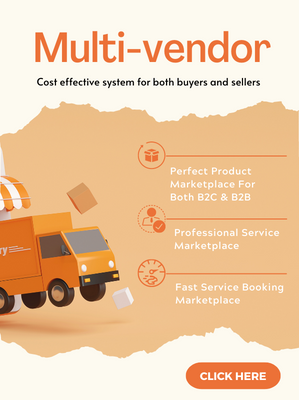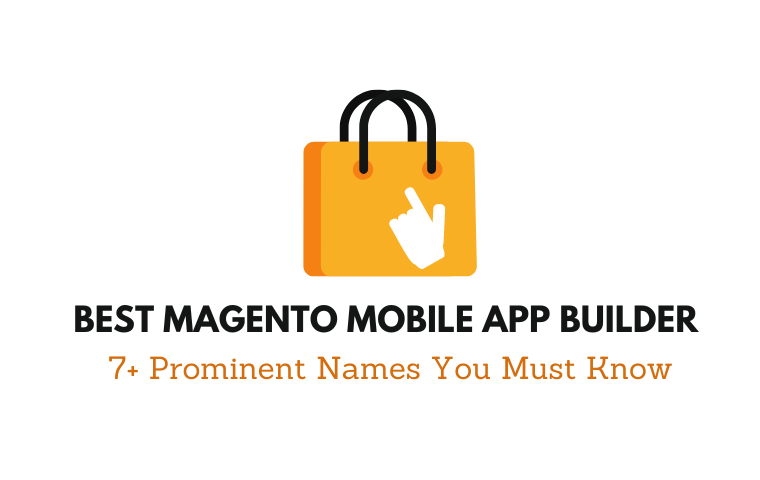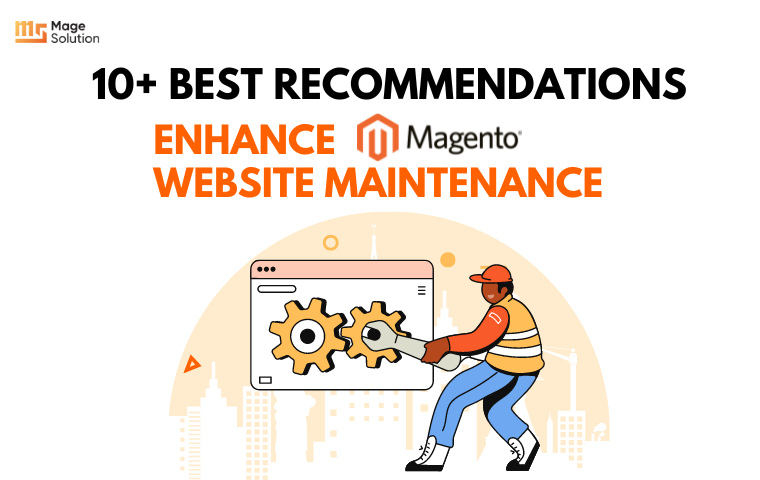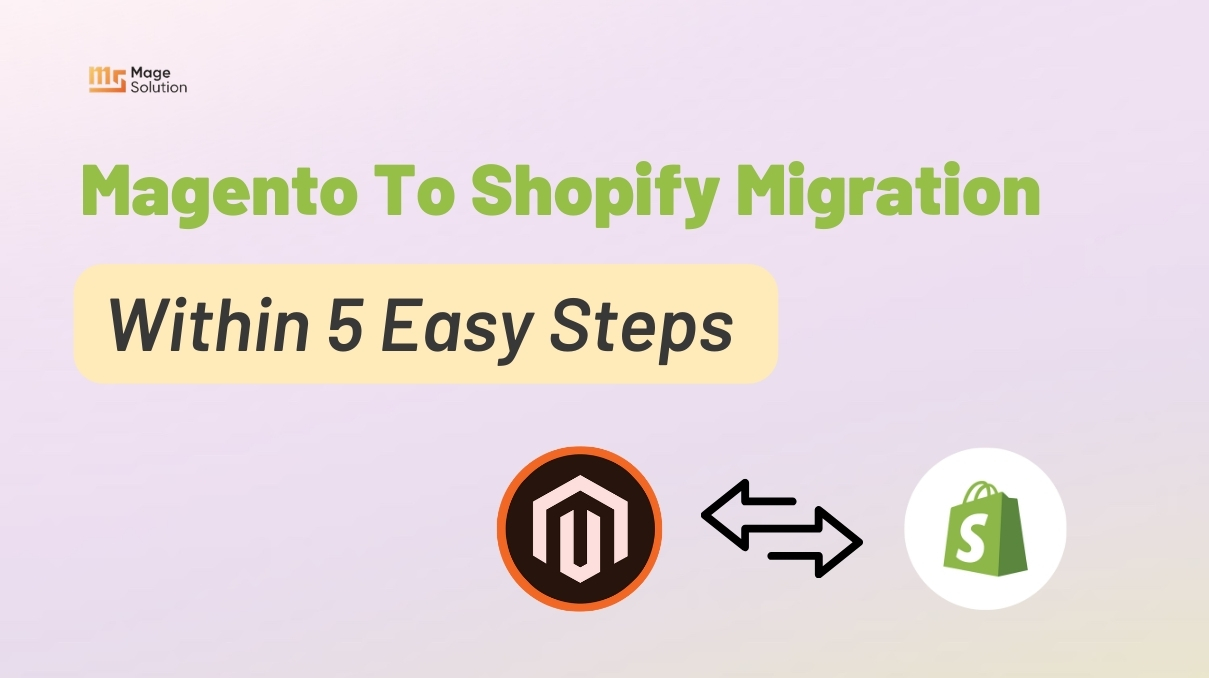In this day and age, the eCommerce market has gained more and more power. Especially, during the pandemic COVID-19, most people under quarantine have no option but to acquire critical goods online. As a result, any merchant that wants to succeed in the eCommerce market should try their best to make long-term client connections.
Every interaction with your online business, from browsing to shipping, is vital to the smart customer. Each interaction strengthens the customer’s connection to your store, helping them to be pleased with their relationship with your business.
In the current digital era, there are many sturdy platforms available to build an equally powerful eCommerce website. Magento is one of them. It provides a great deal of flexibility and open-source features to assist boost revenue.
Salesforce, in the meantime, is a full-featured CRM software for large and small companies. It was just recognized as the most complex CRM platform.
Magento Salesforce integration works wonders for businesses, helping them to better know their customers and give tailored products and services. To show the huge benefits of Magento Salesforce integration, we’ll guide you through some prominent ones and the way to apply this integration.
An overview of Magento and Salesforce
Magento
Magento is a well-known eCommerce platform that many people rely on for their online eCommerce businesses. Plus, Magento eCommerce platform gives you all the necessary tools to attract more customers, sell more products, and enhance your profit.
Magento Community Edition is a free and open-source eCommerce platform that serves as the foundation for thousands of online stores. The program is often used by developers and small businesses to power their online web stores. Developers can enhance the basic code by adding app extensions from the Magento Connect store to it.
The current versions are Magento Commerce and Magento Commerce Cloud, the next version of Magento Community (now known as Magento Open Source). These versions include a number of features. They promote performance and security enhancements.
Salesforce
Salesforce is a customer relationship management system (CRM). And, Salesforce CRM integration is the most used CRM in the world. This platform connects companies with customers in the digital age, as well as teams inside those organizations centered on each customer. As a result, CRM software supports firms in being more connected to and focused on their customers.
Salesforce CRM is a combination of cloud-hosted, complex, data-driven tools that our clients unite on a single platform to provide the critical single source of truth.
Further, Salesforce solutions offer automation, which means that formerly time-consuming and repetitive activities are no longer required. The coolest thing is that they are powered by AI.
Thus, critical insights are identified and presented in a user-friendly format that is tailored to each user and is constantly focused on customer success. Because of this, Salesforce is the finest CRM for Magento.
The power of Magento Salesforce integration
Salesforce and Magento Commerce Cloud are dominant in B2B eCommerce solutions. They are designed to fulfill a wide variety of eCommerce needs, from small to large businesses with complex architecture and various linkages and third-party systems.
Salesforce and Magento may be easily combined. An Application Programming Interface (API) is used by most CRMs to provide integration and external access to their databases (API). The API helps the linked system’s services to be accessed and used by an external system, in this case, Magento.
While Magento provides the backbone for building an online business, Salesforce provides a front-end for locating consumer inquiries. Also, Magento offers a flexible and dynamic catalog management system that allows users to build and administer at least 20 stores from a single admin panel.
Salesforce CRM connection, for example, synchronizes all customer data across all brand nodes, allowing the company to collect all customer-targeting efforts in a single interface.
Why should you use Magento Salesforce Integration?
1. CRM social encouragement
Customers are targeted in a personalized way using social media. Some social media sites, such as Facebook, Twitter, and Instagram, are perfect for growing profit-driven material.
Magento Salesforce merger assists in the creation of engaging content based on prior comments and responses. It allows the customer support team to establish contact with prospects who are interested.
2. Customer profile creation
Magento is an eCommerce platform that collects customer information as well as order details. But, it falls short when it comes to building client profiles, causing salespeople to feel trapped while gathering information about a single consumer. Salesforce enters the scene once more, as it automatically creates and maintains a profile for each client.
3. Both directional synchronization
Businesses that do not use Magento Salesforce integration services sometimes struggle to keep pace with order volume. Moving data from an eCommerce firm to CRM takes a long time and a lot of effort. Further, it causes delays, errors, and data loss.
Magento Salesforce integration services, on the other hand, ensure two synchronizations. It implies that once an order is placed in the Magento front end, its entry in the Salesforce environment is immediately updated.
Merchants will profit from quicker business processes, more accuracy, and consistency. Because of the connectivity, Magento can now provide real-time data on goods, price, shipping, delivery, and other crucial elements.
4. Email campaign creation
Salesforce CRM is useful for the development and administration of an interactive product email campaign to achieve substantial outcomes. Also, it contributes to the development of a visually appealing email template, the finding of relevant customer messages, and the tracking of outcomes.
Salesforce Einstein, a tool that creates personalized content for each recipient depending on past feedback or reaction, assists businesses in reaching their target audience and automatically increasing email click rates.
5. Lightning-fast service
Customers who visit an online store expect their issues to be handled quickly. Operators of eCommerce businesses must know that keeping clients waiting would ruin their image. On each trip, however, you may effectively maintain client contact and services by using the Magento Salesforce connection solution.
If Magento Salesforce integration is enabled, you will be able to keep track of all cases from all channels in a single spot.
An agency does not need to ask the same questions to the same customers again and over. Instead, they may have all of the information they require when Magento Salesforce integration, such as earlier conversations, customer information, and so on, and can deliver the finest services to them.
6. Logical Sales
Obtaining a refined and precise sales report that will aid you in designing your future strategy is one of the most important components of the Magento integration with Salesforce. You may quickly build a statement by selecting the filters and fields that correspond to the metrics you want to track and assess.
With the Magento Salesforce integration solution, you may get a detailed picture of your company’s growth and operations. The Einstein Analytics-powered link assists firms in evaluating historical data, recognizing patterns, and offering data-driven sales estimates.
7. Productivity increase
Magento integration with CRM provides several benefits to organizations, one of which is enhanced efficiency. The integration increases a company’s revenue and sales cycle, resulting in higher efficiency, accuracy, productivity, and speed while decreasing expenditures.
With an integrated system, you may more effectively tackle future problems that lead to duplication in day-to-day operations. Also, dropping numerous layers of procedure decreases manual tasks and saves time.
8. Customer journey customization
The Magento Salesforce integration has helped firms fine-tune their client interactions. Businesses may use the interface to combine and analyze their clients’ data, automate targeted marketing, and track the results.
You can tailor and strategize your marketing efforts in a number of ways. Email studio, social studio, mobile studio, advertising studio, and interaction studio are some of the best technologies that enable your client’s journey.
You may also create a tailored customer journey for a certain client group, letting them connect with your organization and encourage them to buy.
9. Leads that have undergone refinement and processing
Magento Salesforce integration services may assist firms in gaining a deeper level of understanding and improving client connections. Additionally, firms may develop more accurate estimates and anticipate potential hazards or bottlenecks as a result of integration.
Through integration, you may learn about visitors to the eCommerce site, their activities, the time they spend on each page, and their purchase habits, to name a few things.
You may successfully customize your customer experience by bringing them what they want if you have all of this data at your disposal.
An integrated eCommerce platform supplies the company with a lot of information. For example, your team may learn when a transaction occurs, collect important data for cross-selling and up-selling, avoid duplicate leads, and offer your salespeople the most up-to-date lead information.
10. Lower Labor Costs and Boost Productivity
One of the major benefits of Magento Salesforce integration is the act of getting rid of redundant work between Salesforce and Magento. Your company isn’t earning any more money or being more conducive to sales by entering the same information twice into two distinct systems. By connecting Magento and Salesforce in real-time, you can reduce the need for inefficient labor use and expenditures by letting employees and sales staff focus on tasks that affect your company’s sales.
11. Real-time information sharing
Salesforce is a cloud-based CRM that helps real-time data gathering and refining from a variety of sources. Thus, whether the information comes from social networking sites, customer service, or elsewhere, it is all gathered in real-time.
Think about when a customer forgets a shopping cart, the connected system retrieves suitable customer data from CRM in real-time, letting the marketer communicate with the customer in near real-time depending on personalization. If the customer does not appear to be ready to complete his order, the market may present him with an offer based on his past experience. To provide a promotional offer, a discount, or anything else at the correct moment, it is vital to gauge customer interest.
12. Mobile development
Salesforce Magento 2 connection also helps your eCommerce company create a new communication channel. You might also start with mobile marketing to communicate with potential customers through various media like SMS and push notifications.
How to integrate Salesforce with Magento
There are 4 stages to the process of Magento Salesforce integration. Which are:
Step 1: Sign up for an account on Zapier
- Signup for an account on Zapier to integrate Salesforce CRM on Magento
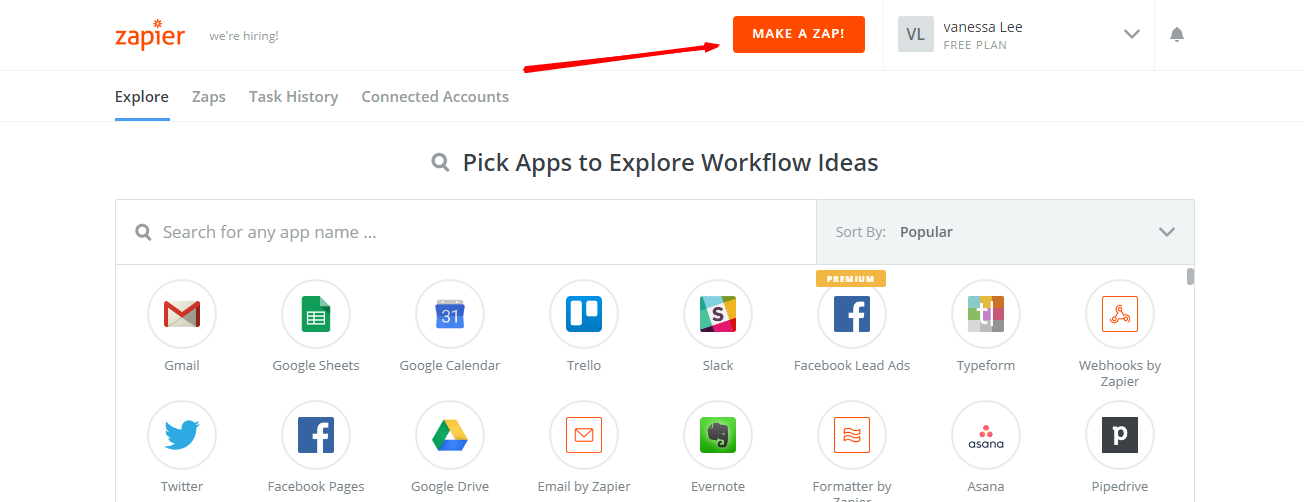
Step 2: Sign up for a Salesforce account
- Sign up for Salesforce
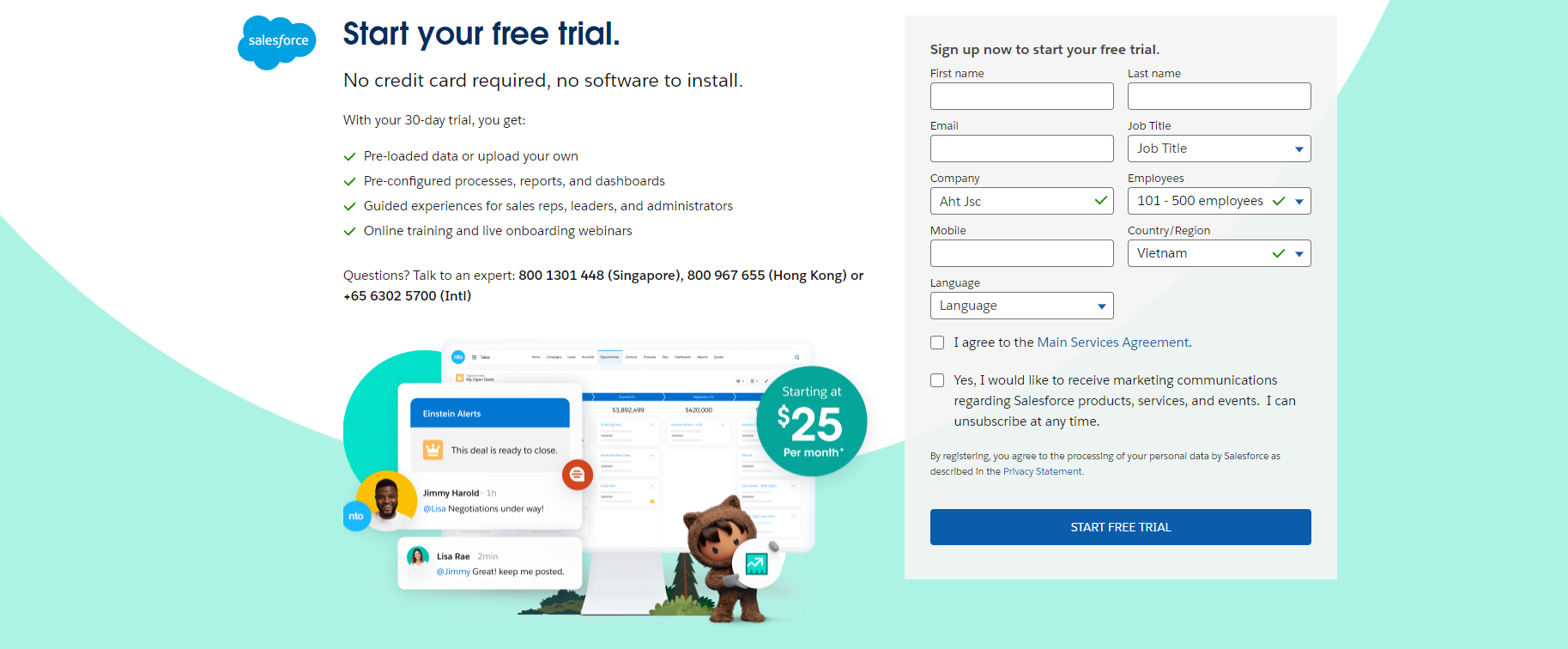
After logging into Zapier, choose “Make a Zap” to start merging
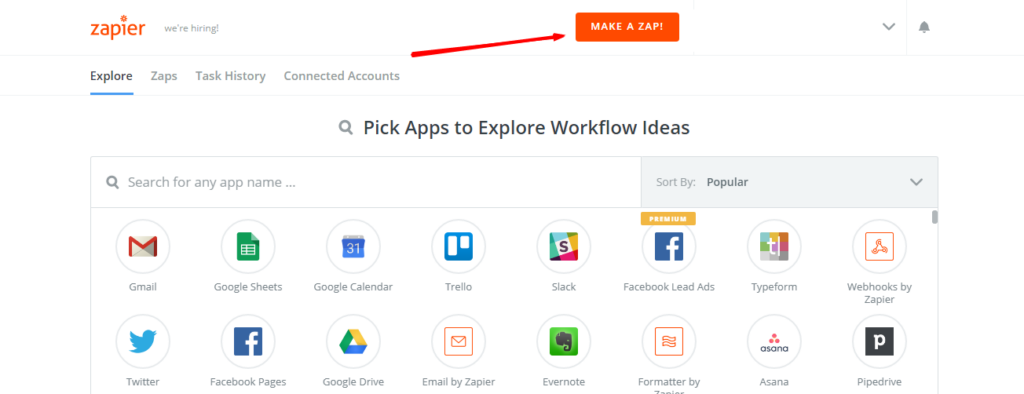
Step 3: Integrate Magento 2.X
- In this step, “Choose a Trigger App”: Magento 2.X or Zoho CRM that you want to combine with your Magento store.
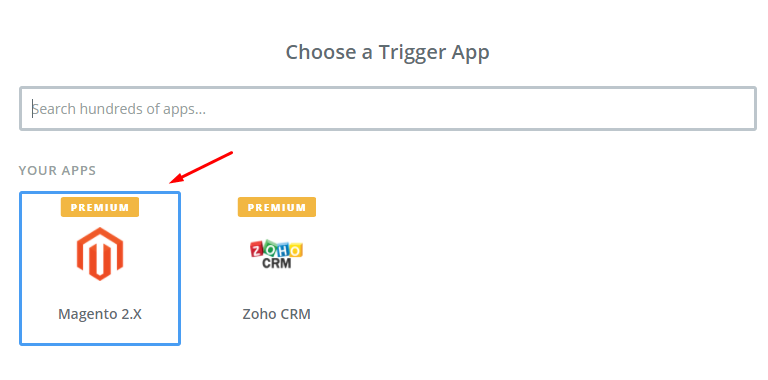
- Then, in the drop-down list, pick Magento 2.X Trigger, such as new customer, and click “Save + Continue”:
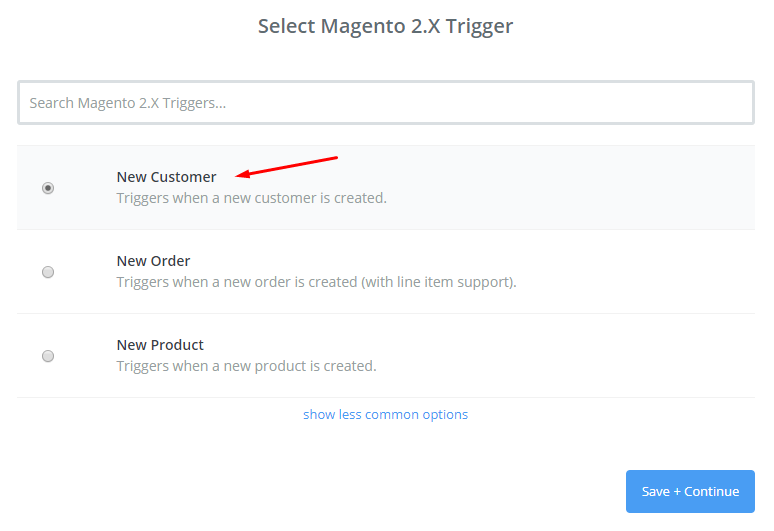
- Then, pick Magento 2.X Account by connecting an account. As seen in the image below, you must input your Magento 2.X store’s entire domain, admin login, and admin password.

- Following the creation of your Magento 2.X account, the following page will appear, and you should select “Save + Continue”:

- Magento 2.X was tested successfully.
Step 4: Integrate Salesforce CRM
- In the “Choose an Action App” field, select Salesforce
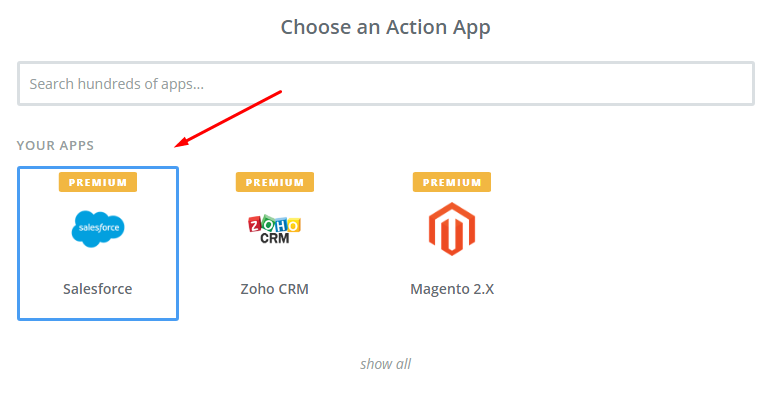
- Then, pick “Create Contact” as the Salesforce action and click “Continue”:
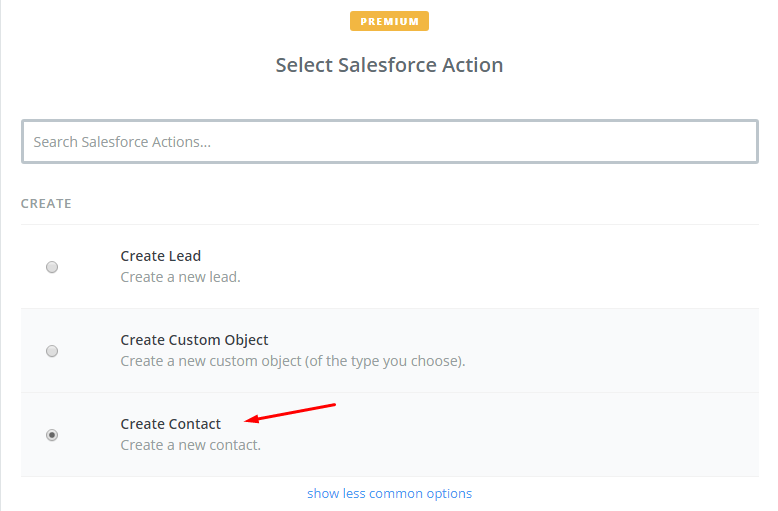
- Then, by the way, you must select Salesforce Account: Click “Connect an Account” and follow the instructions.

- In this phase, you set up the template. Please create a Salesforce contact and fill out all of the required information before clicking the “Continue” button.
- You have now tested Salesforce. Finally, choose “Finish” and enter the name of your zap to finish.
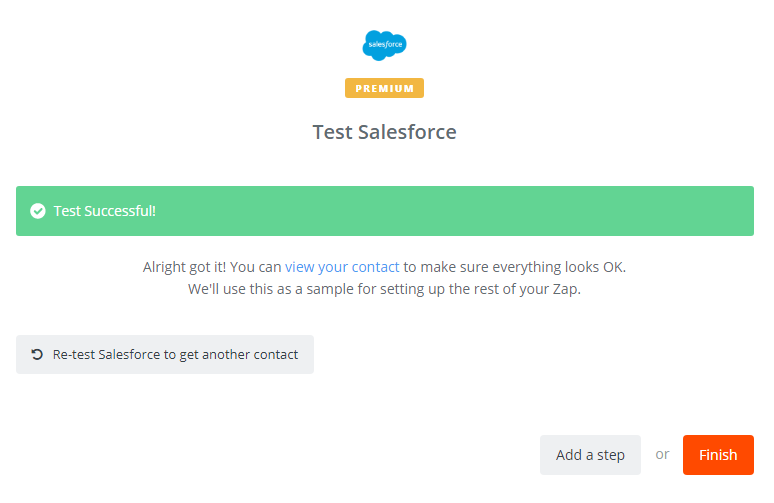
- Your Zap is active, and it will do an auto-check for your Magento 2.X new client.
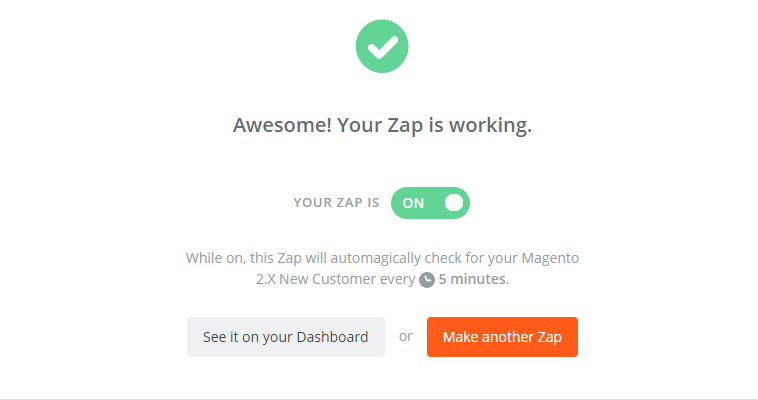
- Finally, here is the file that you just created.
Wrapping Up
It’s time to bring your online store to a new level. But, your e-commerce site cannot function alone. That is why, for even more stunning benefits, your eCommerce website, including customer data and shopping cart features, should be linked with a CRM system.
It is worth noting that Magento’s real-time integration with CRM suites like SugarCRM and Salesforce increases a company’s sales and revenue cycle. This activity improves accuracy, efficiency, speed, and production while decreasing expenditures.
So the moment has come to act. First and foremost, you should get up right now and employ a top Salesforce development firm. Second, you could come across a well-known Magento and Salesforce integration services provider with a staff of experienced CRM experts.
If you don’t know how to integrate Magento with Salesforce, come to us. Magesolution is one of the leading technology solutions providers in Vietnam. We offer the best Magento Third-party integration service, as well as other eCommerce Magento solutions such as Magento PWA, Magento Page Builder, etc. Besides, we provide eCommerce development on some popular platforms: Shopify, Bigcommerce, …. CONTACT US now if you have any questions!
